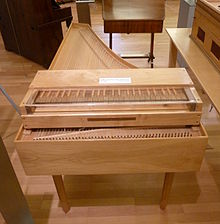Pantaleon lifting dispute
Pantaleon Hebenstreit (born November 27, 1668 in Kleinheringen , † November 15, 1750 in Dresden ) was a German dance teacher , composer and musician . He is best known for the pantal (e) on , a musical instrument named after him , which played a role in the development of the fortepiano .
Life
According to recent research, Hebenstreit, or, more correctly, Hebestreit , was born in Kleinheringen on November 27th, 1668 and was baptized on November 29th in the first name of his father Pantaleon. The father, who is recorded in the Weißenfels files in 1674 as " Thürmer ", died in 1678. On January 29, 1691, Hebenstreit enrolled at the University of Wittenberg , and in 1697 he is registered as a dance master in Leipzig. Around this time he must have made a quarterly visit to Jean-Baptiste Volumier in Berlin, during which, according to Johann Kuhnau, he practiced extensively ("also most nights") on a large chopping board he developed himself .
In 1698 and 1703 Hebenstreit received orders from the Weißenfelser Hof to collaborate on drama and music. In 1705 he traveled to France with his dulcimer. A French source says: "Le Musicien s'appelloit Pantaleon: il vint à Paris vers l'annee 1705" (The musician called himself Pantaleon: he came to Paris around 1705) ; and in Mattheson : "King Louis XIV. in France is said to have baptized the instrument and named it Pantalon." From this point on, the instrument was only called Pantalon / Pantaleon or at least (as with Telemann) Pantalonian cymbal .
After his return, Hebenstreit went looking for a job at a royal court. In 1707 he received one as music director and dance teacher at the court of Saxony-Eisenach . In 1709 Georg Philipp Telemann also got a job here, who was awarded the title of Kapellmeister in August of this year , which placed him above Hebenstreit. Looking back on 1718, Telemann wrote:
- "Monsieur Pantlon, I say, in addition to his experience on many instruments in French music and composition at the same time, he had an uncommon skill, from which I have drawn more advantages than I am able to list here."
Telemann left the Eisenacher Hof in 1712, Hebenstreit was appointed to the Saxon court in Dresden on May 11, 1714 for an annual salary of 1200 Thalers. He is listed there as a chamber musician on the payroll. Kuhnau commented on his work and remuneration: "Regardless of the fact that this excellent master of the year lets himself be heard in front of the king once in a while, he deserves his undaunted effort, which he has taken up from his youth, up to this point ... this, and several others."
In 1733 Hebenstreit gave up his own concerts, but continued to work as director of the Protestant court music. In 1740 he was awarded the title of Secret Chamberlain. He died on November 15, 1750 and was buried three days later in Dresden's Johanniskirchhof .
Hebenreit's most prominent students were the two Viennese pantaleonists Johann Baptist Gumpenhuber and Maximilian Hellmann . His Dresden student Johann Christoph Richter represented him as a Pantaleon teacher from 1734.
literature
- Robert Eitner: lifting dispute, Pantaleon . In: Allgemeine Deutsche Biographie (ADB). Volume 11, Duncker & Humblot, Leipzig 1880, p. 196 f.
- Dieter Härtwig , Christian Ahrens: Hebenstreit [Hebestreitt], Pantaleon. In: Grove Music Online, 2001.
- Lothar Hoffmann inheritance law: lifting dispute, Pantaleon. In: New German Biography (NDB). Volume 8, Duncker & Humblot, Berlin 1969, ISBN 3-428-00189-3 , p. 168 f. ( Digitized version ).
Individual evidence
| personal data | |
|---|---|
| SURNAME | Lifting dispute, Pantaleon |
| BRIEF DESCRIPTION | German composer and dance teacher |
| DATE OF BIRTH | November 27, 1668 |
| PLACE OF BIRTH | Pegs |
| DATE OF DEATH | November 15, 1750 |
| Place of death | Dresden |
